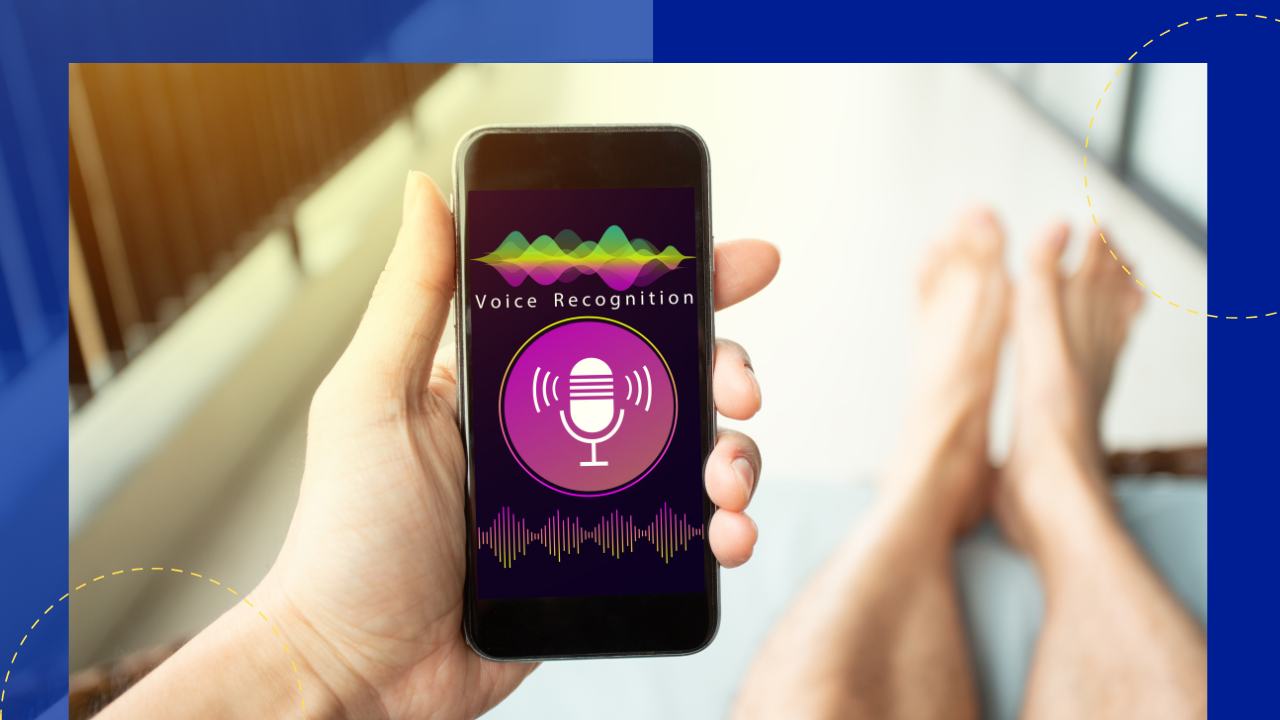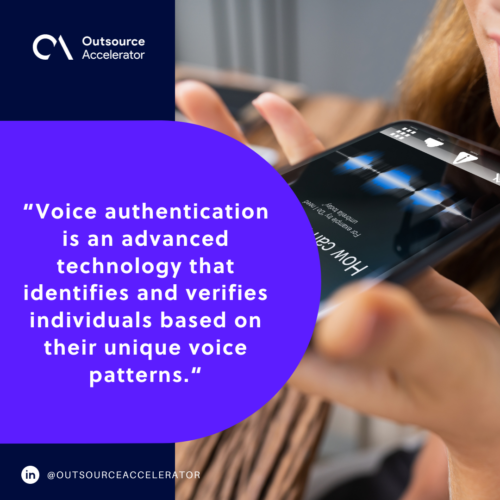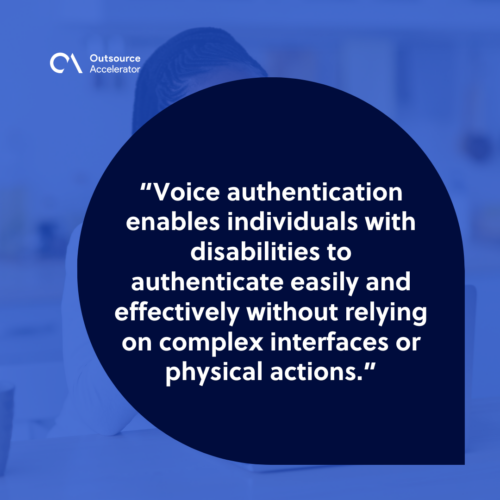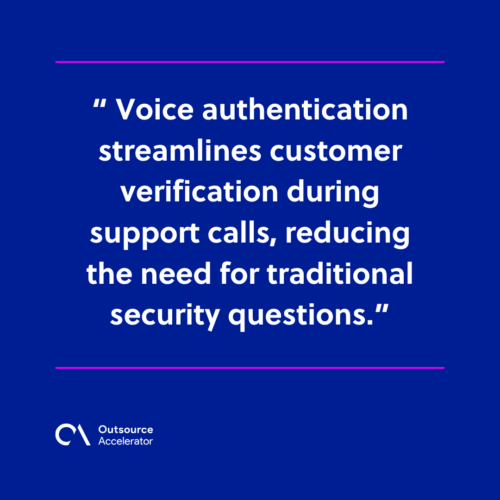Advantages and disadvantages of voice authentication

Voice authentication, or voice biometrics, is one of the advanced ways of authentication used today. It is also considered one of the most secure means of identifying an individual.
Traditional authentication methods, such as passwords or PINs, are susceptible to security risks like identity theft.
Voice authentication has emerged as a promising solution to mitigate these risks by adding additional layers of protection.
This article will explore the advantages and disadvantages of this method.
What is voice authentication, and how does it work?
Voice authentication is an advanced technology that identifies and verifies individuals based on their unique voice patterns.
It analyzes voice characteristics, such as pitch, tone, and cadence, to establish the speaker’s identity.
Unlike traditional voice recognition methods, voice authentication does not rely on passwords or PINs, making it a non-invasive and convenient option.
This technology also works differently from speech recognition, speech-to-text, and voice assistants like Siri. These tools only process verbal language, convert them into text, and act upon the commands given.

Advantages of voice authentication
Voice authentication is widely used in call centers, banks, and other industries requiring additional transaction protection.
Organizations can further improve their security measures by validating a user’s voice, as each person has a unique voice that is hard to replicate.
In addition, voice recognition systems are user-friendly and efficient, streamlining authentication and minimizing fraudulent access.
Here are some of the advantages of using this technology:
Enhanced security and fraud prevention
One of the key advantages of voice authentication is its enhanced security and fraud prevention capabilities.
Unlike PINs, which can be easily forgotten, stolen, or shared, a person’s voice is a distinct and difficult-to-replicate feature. This technology significantly reduces the risk of unauthorized access and fraud.
A good example is in HSBC UK, where telephone fraud was reduced by 50% upon voice authentication.
Seamless user experience
Through voice authentication, users can authenticate themselves simply by speaking, making it intuitive and convenient.
Customers can securely access their banking information by speaking a passphrase rather than recalling a series of digits or answering security questions.
This simplicity improves user satisfaction and reduces frustration associated with traditional authentication methods.
Accessibility and inclusivity
Voice authentication provides a more accessible and inclusive authentication solution than traditional methods.
It enables individuals with disabilities to authenticate easily and effectively without relying on complex interfaces or physical actions.
For instance, visually impaired individuals can independently access their smartphones, make payments, or interact with various devices through voice commands.
Voice recognition systems, like biometric voice recognition system, play a pivotal role in making digital platforms more accessible to individuals with different abilities.

Cost and time efficiency
Implementing voice authentication can result in significant cost and time savings for organizations. It eliminates the need for password resets, call center support for forgotten passwords, and the issue of password sharing.
Additionally, voice authentication reduces the time required for user authentication, resulting in improved operational efficiency.
Increased customer trust
Voice authentication reassures customers of robust security measures, building trust and confidence in the organization.
Customers appreciate the added security layer provided by voice authentication, leading to increased satisfaction and loyalty.
Disadvantages of voice authentication
Despite its many advantages, voice authentication also comes with significant disadvantages:
Voice authentication also has faults and challenges that businesses should be aware of. Here are some of them:
Limitations in noisy environments
One of the challenges of voice authentication is its sensitivity to background noise.
In noisy environments, such as crowded areas or places with poor acoustics, the accuracy of voice analysis may be compromised. This leads to potential false rejections or acceptances.
Vulnerability to voice replication techniques
While voice biometrics are difficult to replicate, techniques like deepfake voice technology can imitate someone’s voice accurately.
One drawback is the risk of voice sample being compromised or recorded without permission, raising privacy and security concerns.
These methods pose a significant threat to voice authentication systems, especially with the rise of AI tools.
It requires continuous advancements in voice analysis technology to counteract them effectively.
Lack of standards and interoperability
The lack of standardized protocols and widespread interoperability pose a challenge to adopting voice authentication across various platforms and devices.
Organizations must ensure compatibility and integration with different systems, limiting their universal implementation.
Ethical and privacy concerns
Voice authentication collects and stores individuals’ biometric data, raising ethical and privacy concerns.
Organizations must adhere to strict privacy regulations and secure storage practices to prevent unauthorized access or misuse of sensitive voice data.
Transparency and clear user consent mechanisms are essential to address these concerns effectively.
Potential errors in voice recognition
Despite voice analysis algorithm advancements, voice recognition errors can still occur.
Another challenge is the accuracy of speech recognition tech, with tone variations, background noise, or a cold impacting system’s user ID.
Factors like changes in voice due to colds or other health conditions, emotional stress, or aging can impact the accuracy of voice authentication systems.
Continuous improvements and refinements are necessary to minimize the occurrence of false rejections or acceptances.
Applications of voice authentication
Voice authentication finds applications across a wide range of industries and use cases:
- Banking and financial institutions. Voice biometrics enables secure access to accounts, transactions, and fund transfer authorization.
- Contact centers. Voice authentication streamlines customer verification during support calls, reducing the need for traditional security questions.
- Smart home technology. Voice biometrics ensures that only authorized individuals can control smart home devices and access personal settings.
- Healthcare. Voice authentication protects patients’ medical records and secures access to sensitive healthcare systems.
- Law enforcement. Voice biometrics assists criminal investigations by accurately identifying suspects based on voice recordings.

Future of voice authentication
While voice authentication offers significant advantages, it has limitations involving environmental sensitivity, vulnerability to replication techniques, and ethical standards.
As technology advances and voice authentication matures, organizations must consider these pros and cons to implement this authentication method effectively and responsibly.
With the advent of multi-factor authentication, incorporating voice authentication solutions enhances security by adding an additional layer of verification beyond traditional methods.
Voice biometrics recognize unique vocal patterns to accurately authenticate users, helping in combating fraud and enhancing user experience.
The future of voice authentication holds promising developments and widespread adoption.
Advancements in machine learning and vocal pattern recognition will enhance voice biometrics’ accuracy, performance, and reliability.
Moreover, voice authentication will become integral to our everyday lives as voice assistants become more prevalent and voice-enabled devices gain popularity.







 Independent
Independent




